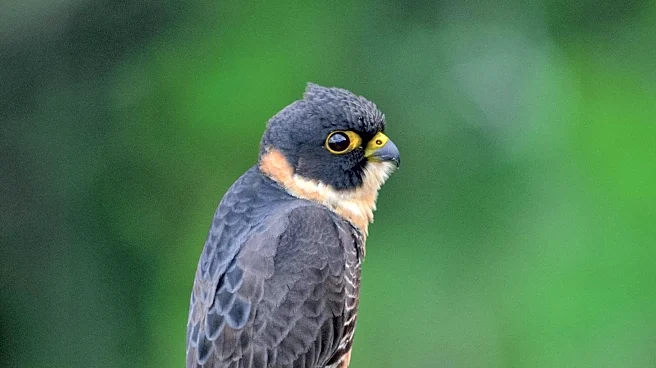What's Happening?
The New Zealand falcon, known as kārearea, has been crowned Bird of the Year in New Zealand's annual bird election, organized by the conservation group Forest & Bird. This event, which has evolved from a simple email poll into a significant cultural moment, involves volunteer campaign managers advocating for their favorite birds through creative means such as memes and dance routines. The contest aims to draw attention to New Zealand's native bird species, many of which are threatened. The kārearea, capable of flying at speeds over 200 km/h, is endemic to New Zealand but faces threats from habitat loss and electrocution on wires. The election saw a high voter turnout, with over 75,000 participants, highlighting the country's passion for its avian wildlife.
Why It's Important?
The Bird of the Year contest underscores the critical conservation issues facing New Zealand's native bird species, with 80% of them in trouble to varying degrees. The event not only raises awareness but also highlights the cultural significance of birds in New Zealand, a country with no native land mammals except bats. Birds play a vital role in the nation's identity, appearing in art, songs, and even the nickname 'kiwis' for New Zealanders. The contest also reflects broader environmental concerns, as successive governments have reduced investment in conservation, impacting tourism, which relies heavily on the country's natural landscapes and wildlife.
What's Next?
The success of the kārearea in the Bird of the Year contest may lead to increased efforts to protect this and other threatened species. Conservationists hope to leverage the attention from the contest to advocate for more government investment in conservation efforts. This could involve initiatives to protect bird habitats and mitigate threats from predators. The contest's popularity might also inspire more community engagement and support for conservation projects, potentially influencing policy decisions and funding allocations.
Beyond the Headlines
The Bird of the Year contest highlights the unique ecological landscape of New Zealand, where birds have evolved in the absence of land mammals, leading to distinctive species and behaviors. The event also raises ethical questions about conservation priorities and the balance between economic development and environmental protection. As New Zealand continues to promote its natural beauty to tourists, the need to preserve its unique wildlife becomes increasingly urgent, posing challenges for policymakers and conservationists alike.








